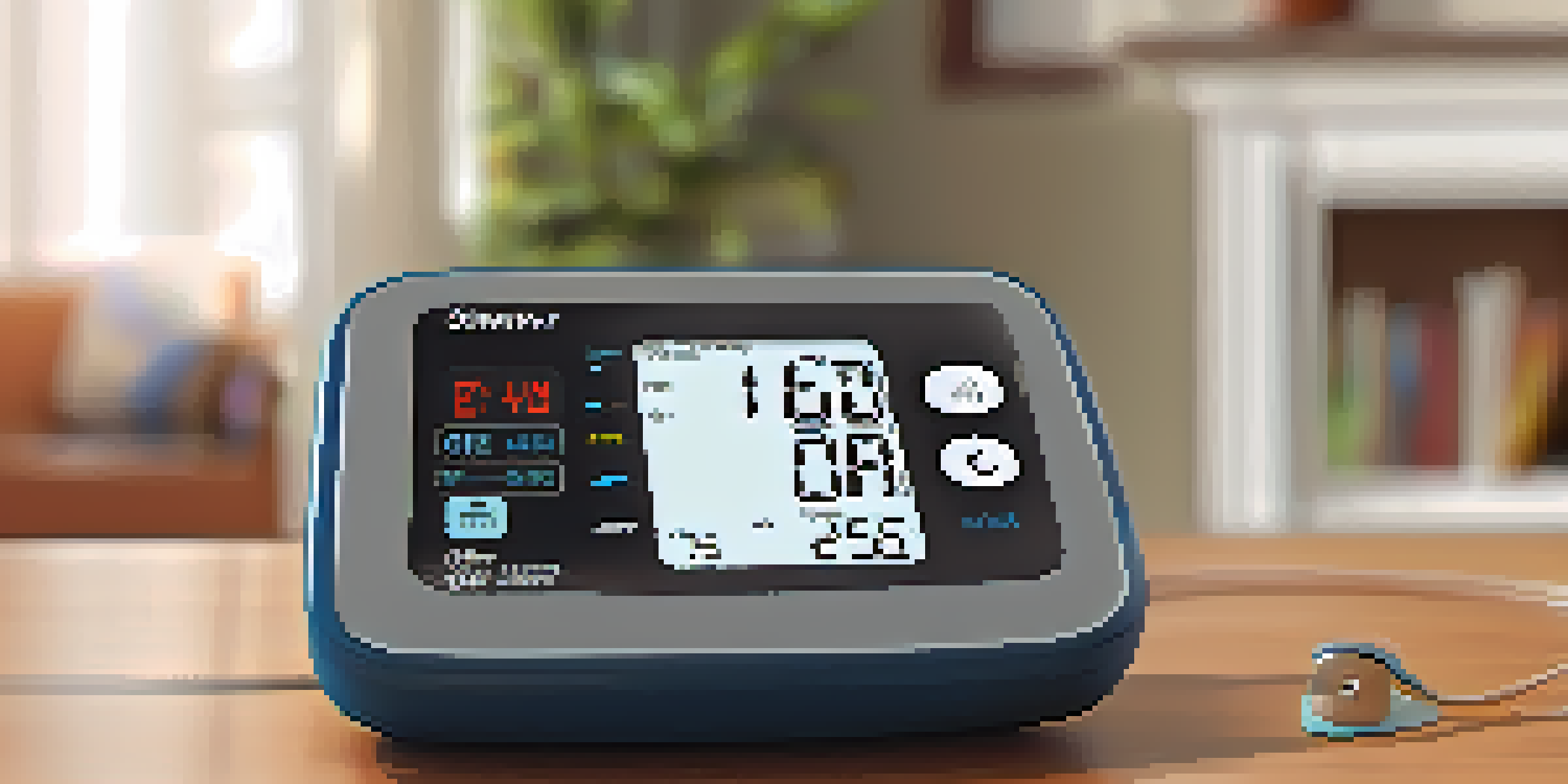The Importance of Monitoring Your Blood Pressure Regularly

Understanding Blood Pressure and Its Importance
Blood pressure is the force of blood against the walls of your arteries, and it plays a crucial role in overall health. Monitoring it regularly is important because it helps you catch any potential issues early on. High blood pressure, often called the 'silent killer,' can lead to serious conditions like heart disease and stroke if left unchecked.
The greatest weapon against stress is our ability to choose one thought over another.
Imagine your blood vessels as a garden hose. If the pressure is too high for too long, the hose can wear out or burst. Similarly, consistently high blood pressure can damage your arteries and organs over time, making it vital to keep an eye on it.
By understanding blood pressure and its implications, you empower yourself to take control of your health. Regular monitoring equips you with the knowledge to make informed decisions about your lifestyle, diet, and medical interventions.
How Blood Pressure Affects Your Body
Blood pressure affects various organs and systems in your body, including your heart, kidneys, and brain. When your blood pressure is consistently high, it forces your heart to work harder, which can lead to heart failure. Additionally, the kidneys, which filter blood, can become damaged, impacting their ability to regulate fluid and electrolyte balance.

Think of your heart as a pump in a water system. If the pressure is too high, the pump can eventually fail, causing the entire system to break down. This analogy illustrates how critical it is to maintain healthy blood pressure levels for the smooth functioning of your body.
Understand Blood Pressure Importance
Monitoring blood pressure is crucial for early detection of health issues like heart disease and stroke.
By monitoring your blood pressure, you can gain insights into how your body is responding to various factors, such as stress, diet, and exercise. This awareness can lead to proactive changes that promote long-term health.
Risk Factors for High Blood Pressure
Several risk factors can contribute to high blood pressure, including age, genetics, obesity, and a sedentary lifestyle. For instance, as we age, our arteries can become stiffer, making it more likely for blood pressure to rise. Understanding these risk factors is essential in preventing and managing hypertension.
An ounce of prevention is worth a pound of cure.
Consider risk factors like pieces of a puzzle; each one contributes to the bigger picture of your health. The more pieces you can identify and address, the clearer your health picture becomes. This proactive approach can help you mitigate potential health issues down the line.
By being aware of your risk factors, you can take steps to manage them, such as maintaining a healthy weight, exercising regularly, and eating a balanced diet. Regular blood pressure monitoring can help you track the impact of these lifestyle changes.
How to Monitor Your Blood Pressure at Home
Monitoring your blood pressure at home is easier than you might think. All you need is a reliable digital blood pressure monitor, which can be found at most pharmacies. These devices are user-friendly and can provide instant readings, allowing you to keep track of your blood pressure conveniently.
Imagine having a fitness tracker for your heart; that's essentially what a blood pressure monitor does. It gives you real-time feedback on how your body is doing, helping you stay informed and proactive about your health. Regular monitoring can reveal patterns and fluctuations you might not notice otherwise.
Lifestyle Changes Lower Blood Pressure
Incorporating healthy habits such as diet and exercise can significantly reduce blood pressure levels.
To get the most accurate readings, it's best to measure your blood pressure at the same time each day and under similar conditions. Keeping a log of your readings can also help you notice trends and share valuable information with your healthcare provider.
Recognizing Symptoms of High Blood Pressure
High blood pressure often shows no symptoms, which is why it's known as the 'silent killer.' However, some people may experience headaches, dizziness, or nosebleeds when their blood pressure is significantly elevated. Being aware of these symptoms can prompt you to check your blood pressure and take necessary action.
Think of symptoms as warning lights on a dashboard; they signal that something might be off. Just like ignoring a flashing light can lead to more significant problems in your car, overlooking potential signs of high blood pressure can lead to serious health complications.
If you notice any unusual symptoms, don't hesitate to check your blood pressure and consult a healthcare professional. Early detection and intervention can make a substantial difference in your long-term health outcomes.
Lifestyle Changes to Lower Blood Pressure
Making lifestyle changes can have a significant impact on lowering blood pressure. Incorporating regular physical activity, eating a balanced diet rich in fruits and vegetables, and reducing salt intake are all effective strategies. Even small changes, like taking the stairs instead of the elevator, can contribute to better heart health.
Picture your lifestyle as a garden; the more you nurture it with healthy choices, the more it flourishes. Each positive change you make is like watering your plants, helping them grow stronger and more vibrant. This analogy illustrates how a commitment to healthier habits can yield long-term benefits.
Consult Professionals When Needed
It's important to seek medical advice if you consistently record high blood pressure readings or experience concerning symptoms.
In addition to diet and exercise, managing stress through mindfulness practices like yoga or meditation can also help lower blood pressure. The cumulative effect of these lifestyle changes can lead to a healthier, happier you.
When to Consult a Healthcare Professional
While monitoring your blood pressure at home is essential, there are times when consulting a healthcare professional becomes necessary. If you consistently record high readings or experience concerning symptoms, it’s crucial to seek medical advice. A doctor can provide personalized guidance, assess your condition, and recommend appropriate treatments.
Think of your healthcare provider as your health coach. They have the expertise to help you navigate the complexities of managing blood pressure, just like a coach helps an athlete improve their performance. This support can be invaluable in developing a tailored plan that fits your needs.

Early intervention can prevent complications and improve your quality of life. So, don’t hesitate to reach out to your healthcare provider if you have concerns about your blood pressure.